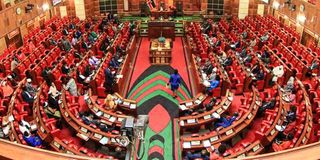For women, the Budget's silver lining comes with a dark cloud

Parliament during a past session. Both Houses have been allocated funds in the proposed budget.
What you need to know:
- Kenya's 2024/25 Budget increases funding for women's empowerment initiatives but halves support for free maternity services.
- This reduction threatens to undermine recent progress in maternal health care, potentially putting mothers and newborns at risk.
- The budget decisions highlight a complex balancing act between advancing women's economic opportunities and maintaining crucial health services.
As the sun rises over Nairobi’s Kayole, Ruth Achieng’, a 28-year-old expectant mother, nervously counts the coins in her worn leather purse. Her due date is fast approaching and she wonders if the free maternity services she has been relying on will still be available when her baby arrives.
Ruth's story is just one of many that illustrate the real-world impact of Kenya's latest budget decisions on women's health and empowerment.
In a country where maternal health has long been a pressing concern, last week’s budget presentation to Parliament by Treasury Cabinet Secretary Njuguna Ndung'u has stirred both hope and anxiety among Kenyan women. The Sh3.9 trillion Budget for 2024/25 presents a complex picture for women's issues, with some areas seeing increased funding while others face cuts.
On the positive side, the National Government Affirmative Action Fund (NGAAF) has received a boost, with its allocation increasing from Sh3 billion to Sh3.5 billion. This fund, born out of the 2010 Constitution, aims to address historical disadvantages faced by marginalized groups, including women. Controlled by the 47 women representatives, NGAAF provides crucial support for socioeconomic empowerment and enterprise development.
Additionally, the Women Enterprise Fund will receive Sh182.8 million, offering financial support to women entrepreneurs like Sarah's sister, who runs a small tailoring business. The government has also allocated Sh1 billion for family planning and reproductive health commodities, recognising the importance of these services in achieving gender equality and women's empowerment.
Kenya's progress in family planning is evident, with the percentage of married women using modern contraceptives rising from 32 per cent in 2003 to 57 per cent in 2022. This improvement has helped women like Ruth's neighbour, Emily, who can now better plan her family and pursue her education.
Over the same period, however, the unmet need for family planning declined from 27 per cent to 14 per cent (KDHS 2022). The country aims to achieve 64 per cent modern contraceptive prevalence by 2030.
However, the budget's silver lining comes with a dark cloud. The funding for free maternity services, a cornerstone of Kenya's efforts to improve maternal health, has been slashed by half - from Sh4 billion to Sh2 billion. This reduction threatens to undermine the Linda Mama (protect the mother) program, which has been instrumental in increasing the number of babies born in healthcare facilities to 82 per cent.
For women like Ruth, this cut could mean the difference between a safe, attended birth and a potentially dangerous home delivery. The budget reduction raises concerns about the quality of care in public health facilities, many of which already struggle with inadequate infrastructure, equipment, and staffing.
As Ruth walks to her local clinic for a prenatal check-up, she passes old posters celebrating Kenya's commitment at the 2019 ICPD25 Nairobi Summit to eliminate preventable maternal and new-born mortality by 2030. She wonders how this promise can be kept with dwindling resources. The recent budget cuts pose a threat to ICPD’s ambitious goals, potentially leading to more unsafe births and compromising the health and safety of mothers and their babies
The story of Kenya's 2024/25 budget is one of contrasts - increased support for women's economic empowerment on one hand, and potential setbacks in maternal health care on the other.
As the new financial year approaches, women across Kenya, like Ruth, wait with bated breath to see how these policy decisions will affect their lives and the future of their families.
For now, she can only hope that when her time comes, the system will still be there to support her and her new-born, embodying the true spirit of 'Linda Mama'. The program provides a basic package of services free of charge to pregnant Kenyan citizens, accessible in public and faith-based facilities.

